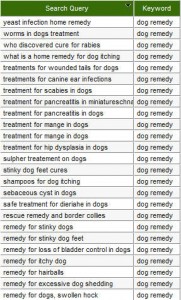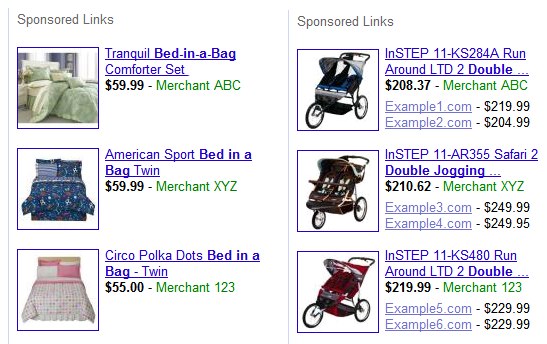This post originally appeared as my column in Search Engine Watch.
As paid search marketers, we generate profit by minimizing our cost (CPC) and exposure (keywords) to those that are most valuable.
As a publisher (search results are just page views that need to be monetized), Google generates profits by maximizing page views and their profit per page view. It works like this:
The friction between our goals versus Google’s is concentrated at the point of their profit per page view. We want to get as many profitable clicks as possible at the least possible price. Google wants to sell as many clicks as possible clicks to us at our minimum acceptable profit, which in turn maximizes their revenue per click and page view.
We want to limit our targeting and decrease our cost.
Google wants to expand our targeting and increase our cost.
There are 2 barriers in Google’s path to higher profit per page view:
- The keywords you choose. The narrower your scope, the fewer ads displayed per page view
- What you pay per click. The lower your CPC, the lower their margin per click.
In this article, I’m going explain you how Google is systematically trying to remove these barriers to their profit, show you how it impacts your business and give you options to respond.
.
The Old Way: Asking You To Increase Your Exposure
Traditionally, Google has used two levers for increasing your targeting.
 First, they can expand your targeting with your grudging consent. When you choose to use broad match, you are willingly accepting Google’s imperfect matching algorithm to save time. Case in point: they have recently increased the types of queries your ad shows up for when you use broad match. They’re already doing this with session-based retargeting (here, and in my article The Rise of Universal Paid Search). There’s no way to opt-out of that option, though there’s a limit to what they can do.
First, they can expand your targeting with your grudging consent. When you choose to use broad match, you are willingly accepting Google’s imperfect matching algorithm to save time. Case in point: they have recently increased the types of queries your ad shows up for when you use broad match. They’re already doing this with session-based retargeting (here, and in my article The Rise of Universal Paid Search). There’s no way to opt-out of that option, though there’s a limit to what they can do.
Alternatively, Google can also try to persuade you to broaden your targeting yourself. This is the thrust of the AdWords opportunities tab. Here, Google presents you with a list of potential keyword additions with the caveat that your mileage may vary. By facilitating the process of keyword expansion with the Opportunities tab or the Search-query Based Keyword Tool, they hope to get you to volunteer to expand your reach.
Neither of these methods is particularly efficient at growing Google’s profit per page view. Expanding broad match still anchors your potential reach to your basket of keyword and facilitating keyword research relies on the advertiser to do something.
Imagine, instead, that keywords were taken out of the equation entirely. Think about a scenario where Google could show your ad for any keyword related to broad descriptions of your business and target audience or even a scenario
This isn’t some farfetched idea. It’s actually happening right now with Google Product Listing Ads.
.
The First Step in Paid Search Without Keywords
Google Product Listing Ads shows image of products, without text ads, in search results, thereby disrupting the standard presentation of just text ads on the search results page. What’s most interesting is that keywords don’t determine when the image ads appear:
“Product Listing Ads requires no keywords or additional ad text. Whenever a user enters a search query relevant to an item in your Google Merchant Center account, Google will automatically show the most relevant products along with the associated image, price and product name”
Here’s what they look like:
Even more revolutionary, Google doesn’t charge a cost-per-click. The ads are sold entirely on a cost-per-acquisition basis (more on that in part 2):
“Product Listing Ads are charged on a cost-per-action (CPA) basis, which means that you only pay when a user clicks on your ad and completes a purchase on your site.”
More details here and here and in the broader context of Universal Paid Search.
.
Our Keyword-Less Future
The idea of keyword-less paid search isn’t new. In fact, Nick Fox introduced the idea at Search Engine Strategies last year. His interview with Web Pro News offers a recap (more here):
![]()
It shouldn’t be a shock that Google is trying to remove keywords from the equation. They are an inefficient way to get advertisers to spend money.
What is surprising is just how quickly Google has integrated a keyword-less version of paid search among more standard text ads. And, they did it without the opportunity for image ads driven by keywords or detailed reporting and analysis.
Google is creating two AdWords ecosystems: those who rely on Google to manage their paid search and those who don’t.





